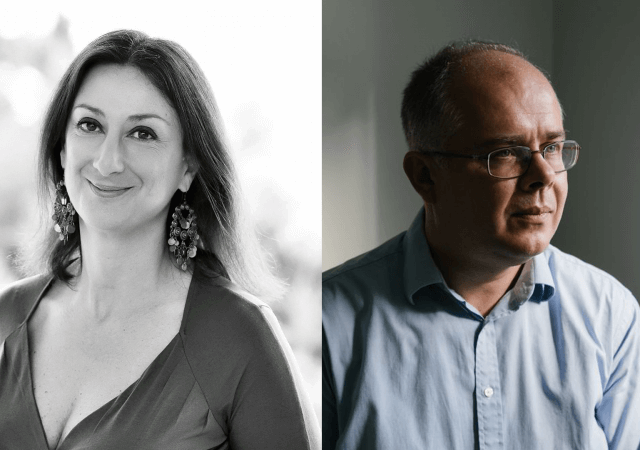Daphne Caruana Galizia
Daphne Caruana Galizia worked as an investigative journalist, blogger, and anti-corruption activist for over 30 years. Daphne focused much of her investigative work on uncovering crime and corruption in Malta’s ruling class. She began her journalism career as a columnist in Maltese newspapers and worked for The Sunday Times of Malta and The Malta Independent, among other publications.
In 2008, she started a blog, Running Commentary. The blog gained a large following and quickly became one of the most popular websites in Malta, regularly attracting more readers than the entire country’s newspapers combined. The nature of her reporting made her a target for abuse, slander, and intimidation by those she was exposing. She received near-daily threats and attacks intended to silence her; despite the barrage of violence and intimidation, Daphne continued her work.
In 2016 following the release of the Panama Papers documents, Caruana Galizia uncovered that two high-ranking government officials were the beneficiaries of secret offshore accounts. She discovered that the officials were also due to receive payments from 17 Black Limited, another Panama shell company owned by businessman, Yorgen Fenech.
On October 16, 2017, Daphne was killed after a bomb placed in her car detonated. Her death sparked protests around the country; demonstrators took to the streets to protest rampant corruption in Malta and to demand justice for Daphne’s death. The demonstrations triggered a political crisis resulting in the resignation of several government officials, including the Prime Minister. Four individuals – including Yorgen Fenech – have been charged in connection with her murder, but none have yet been convicted. Daphne’s family started the Daphne Caruana Galizia Foundation to continue her work and to support investigative journalists.
“Receiving the Allard Prize for International Integrity on behalf of our mother, Daphne Caruana Galizia is both humbling and encouraging,” said Daphne’s family. “It not only recognises her work in exposing corruption and defending the public’s right to know, it also recognises that Daphne should be celebrated for everyone’s sake, because her example of courage, integrity and humour in the face of adversity are so badly needed today and will be for many years to come.”
“The financial part of the award will be dedicated to the objectives of the Daphne Caruana Galizia Foundation: ensuring full justice for Daphne and the guardianship of her work; protecting investigative journalists and ending impunity for the murder of journalists; supporting independent, non-partisan media; and supporting public interest litigation and access to justice. We hope that the honour itself will inspire those who have taken up Daphne’s work to never give up and that it will encourage others to take up the fight against corruption and abuse of power.”
Howard Wilkinson
Howard Wilkinson worked in the Baltic Trading Unit of Danske Bank when he discovered irregularities in bank records that suggested possible money laundering. Upon further research, Howard discovered that a number of accounts that had been marked dormant were making transactions worth tens of millions of dollars. Through his investigation, Howard learned that the bank had ignored numerous financial regulations meant to detect and prevent money laundering. Howard submitted four separate reports to the internal audit unit before ultimately resigning from Danske Bank.
In 2018, when the scandal broke, Howard’s anonymity was violated when he was identified as the whistleblower. Despite considerable risks to his safety, Howard testified before the European Parliament and advocated for greater protections for whistleblowers and for new regulatory requirements to improve transparency. The scandal led to numerous investigations and criminal charges across Europe. Dankse Bank’s CEO resigned, and Danske Bank was forced to cease operations in Estonia.
“Whistleblowers play a very important role in exposing wrongdoing that is otherwise hard to detect,” said Wilkinson. “But all too often whistleblowers are made to suffer for what they have done. I am honoured to receive the Allard Prize. It sends an important message that whistleblowing is important and that whistleblowers should be valued in building the sort of society we all want to live in.”


